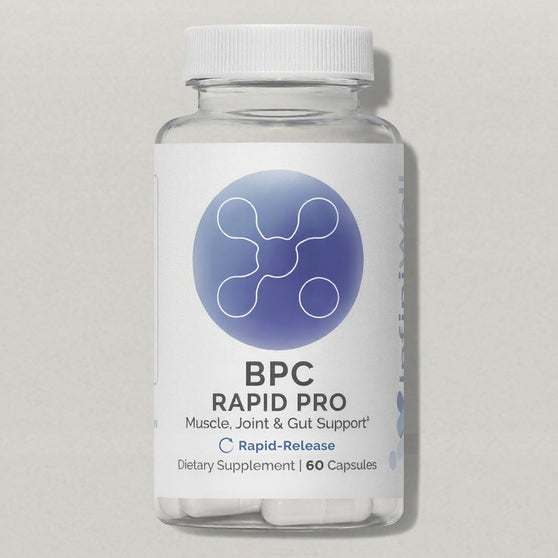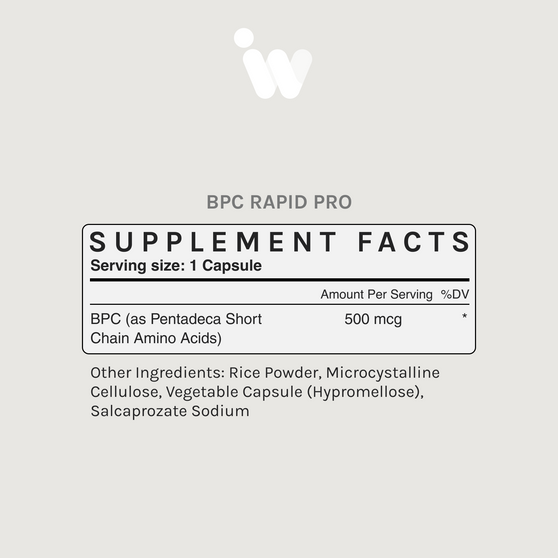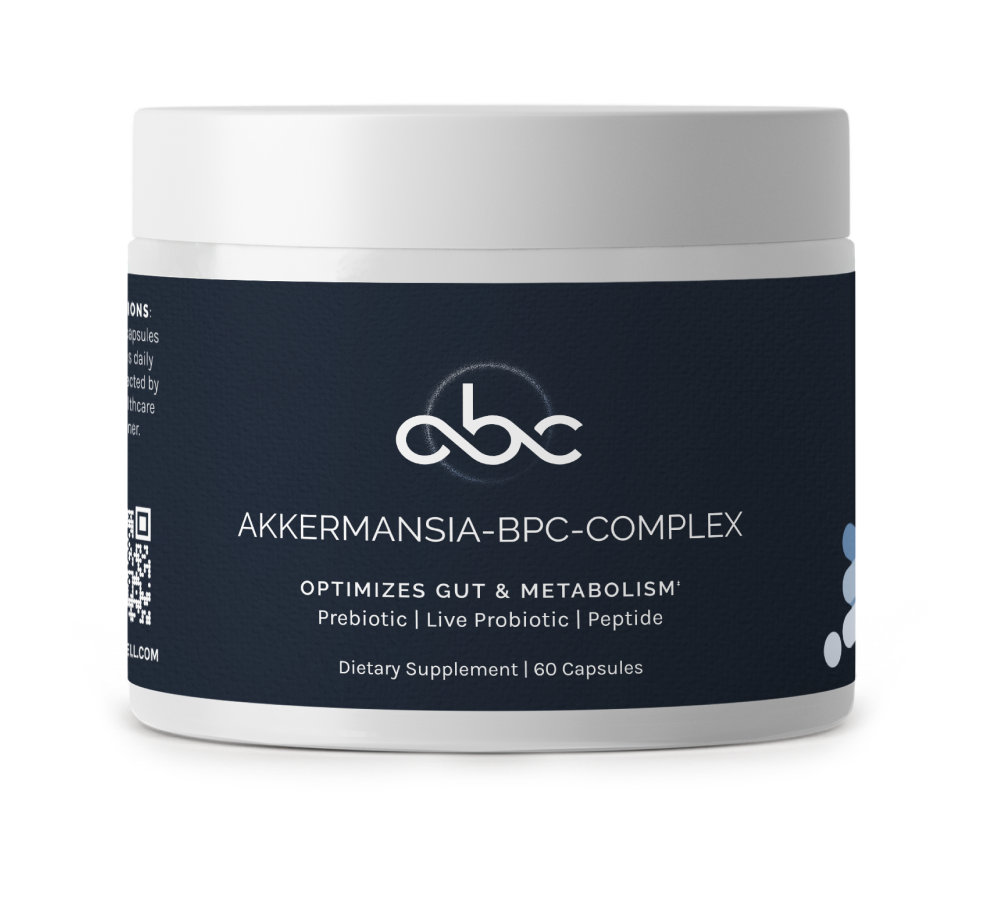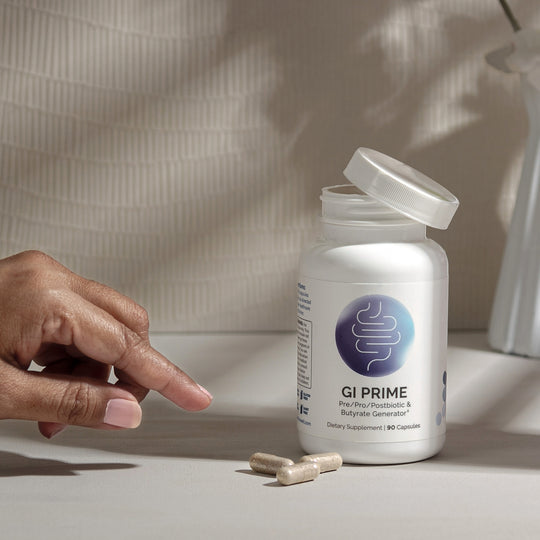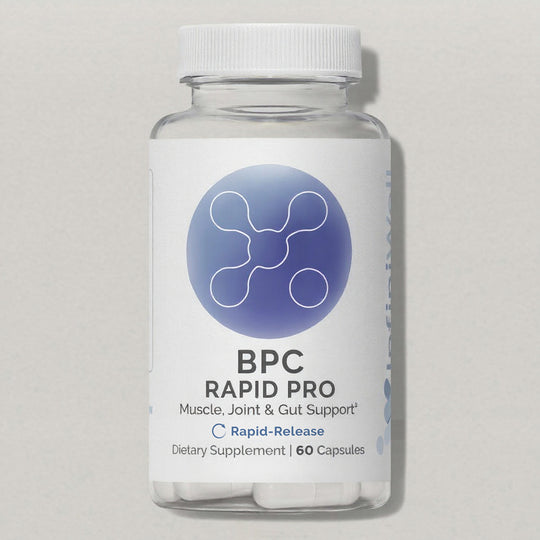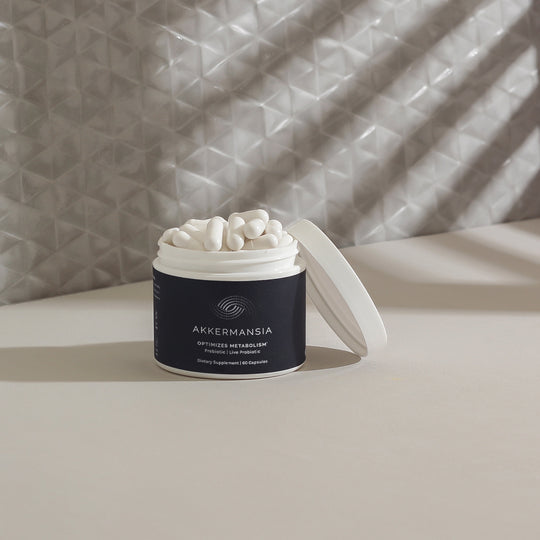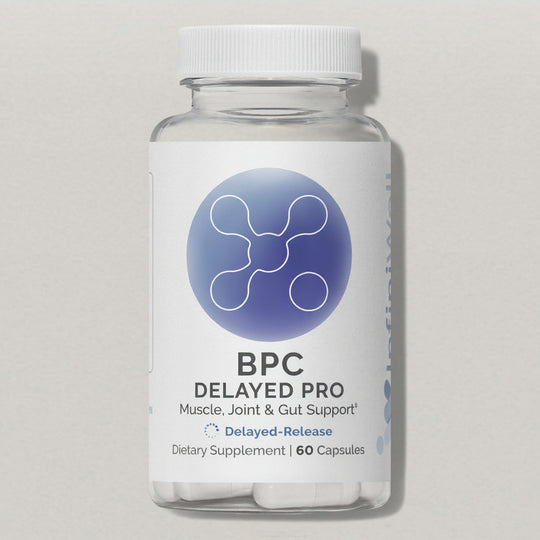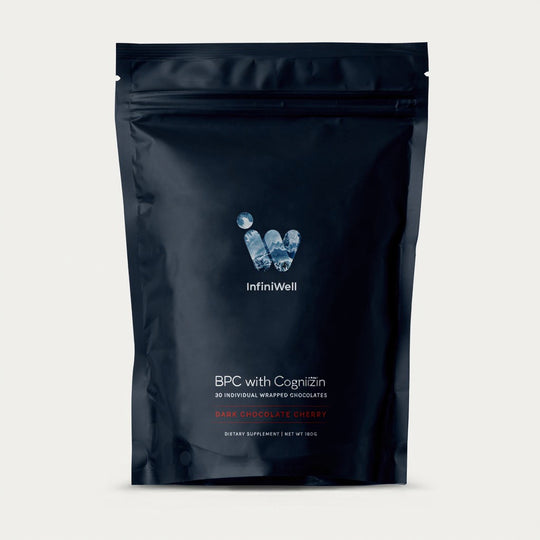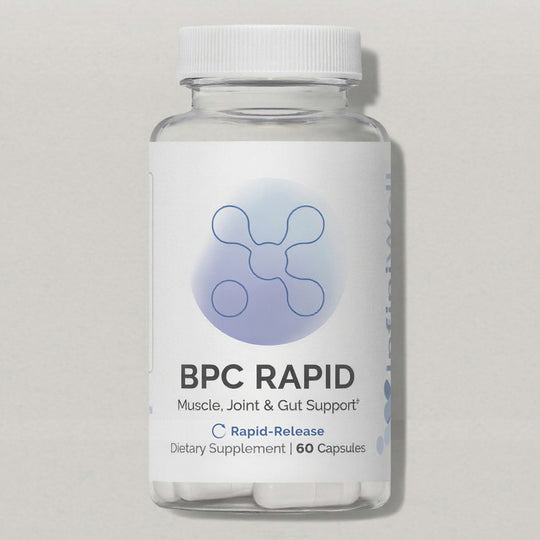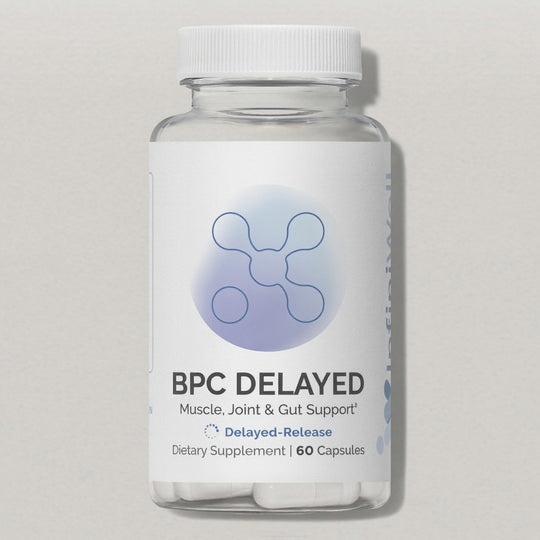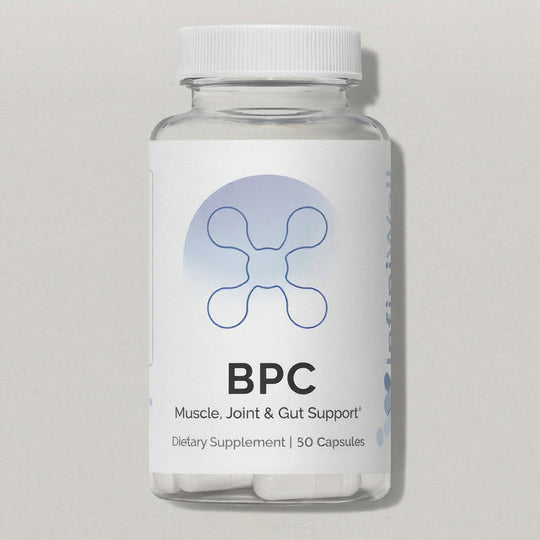ACTIVATED MAGNESIUM
Sleep, Mood & Musculoskeletal Support*
- Supports Healthy Neurotransmitter Metabolism
- Promotes Vascular Relaxation & Pliability
- Maintains Healthy Levels of Melatonin
- Aids in Healthy Levels of ATP Production
Active Ingredients: Magnesium, Malic Acid
Other Ingredients: Rice Powder, Hydroxypropyl Methycellulose, Magnesium Stearate, Silicon Dioxide, Vegetable Capsule (Hypromellose, Titanium Dioxide)
Take 2 capsules daily or as directed by your healthcare provider
Daily
2 Capsules
Akkermansia
Prebiotic | Live Probiotic*
- Supports GLP-1 Production
- Promotes Metabolic Efficiency
- Aids in Optimizing Gut Barrier Integrity
- Promotes Leaner Body Composition
Active Ingredients: Akkermansia (Live Akkermansia muciniphila), Sunfiber® Prebiotic (Galactomannan Fiber)
Other Ingredients: Vegetable Capsule (Hypromellose, Gellan Gum), Microcrystalline Cellulose, Magnesium Stearate
Take 1-2 capsules daily with water or as directed by your healthcare practitioner.
Daily
1-2 Capsules
ASHWAGANDHA
Stress Support and Mental Clarity*
- Promotes Hormonal Balance
- Supports Mental Clarity & Elevated Mood
- Facilitates An Optimal Environment For Normal Tissue Repair
- Optimizes Immune System Health
Active Ingredients: Ashwagandha, Black Pepper Extract
Other Ingredients: Vegetable Capsule (Hypromellose)
Take 2 capsules daily with water or as directed by your healthcare practitioner.
Daily
2 capsules
BPC DELAYED
Muscle, Joint & Gut Support*
- Joint and Soft Tissue Support
- Promotes Digestive Function
- Neurological Support
- Optimizes Nitric Oxide Production
Active Ingredient: BPC
Other Ingredients: Rice Powder, Microcrystalline Cellulose, Salcaprozate Sodium, Vegetable Capsule (Hypromellose, Gellan Gum)
Take 1 capsule twice daily or as directed by your healthcare practitioner.
Twice daily
1 Capsule
BPC DELAYED PRO
Muscle, Joint & Gut Support*
- 60 Capsules
- 30 Capsules
- Joint and Soft Tissue Support
- Promotes Digestive Function
- Neurological Support
- Optimizes Nitric Oxide Production
Active Ingredient: BPC
Other Ingredients: Rice Powder, Microcrystalline Cellulose, Salcaprozate Sodium, Vegetable Capsule (Hypromellose, Gellan Gum)
Take 1 capsule twice daily or as directed by your healthcare practitioner.
Twice daily
1 Capsule
BPC Original
Muscle, Joint & Gut Support*
- Joint and Soft Tissue Support
- Promotes Digestive Function
- Neurological Support
- Optimizes Nitric Oxide Production
Active Ingredient: Body Protective Compound
Other Ingredients: Other Ingredients: Rice Powder, Microcrystalline Cellulose, Vegetable Capsule (Hypromellose)
Take 1 capsule twice daily or as directed by your healthcare practitioner.
Twice daily
1 Capsule
BPC Probiotic
BPC | Live Probiotic*
- Supports Healthy Gut Microbiota
- Aids in Optimizing Gut Barrier Integrity
- Helps Promote GLP-1 Production
- Promotes Leaner Body Composition
Active Ingredients: Akkermansia (Live Akkermansia muciniphila), BPC 250mcg (as Pentadeca Short Chain Amino Acids), Sunfiber® Prebiotic (Galactomannan Fiber)
Other Ingredients: Vegetable Capsule (Hypromellose, Gellan Gum), Microcrystalline Cellulose, Salcaprozate Sodium, Magnesium Stearate
Take 1-2 capsules two times daily with water or as directed by your healthcare practitioner.
Daily
1-2 Capsules
BPC RAPID
Muscle, Joint & Gut Support*
- Joint and Soft Tissue Support
- Promotes Digestive Function
- Neurological Support
- Optimizes Nitric Oxide Production
Active Ingredient: BPC
Other Ingredients: Rice Powder, Microcrystalline Cellulose, Salcaprozate Sodium, Vegetable Capsule (Hypromellose)
Take 1 capsule twice daily or as directed by your healthcare practitioner.
Twice daily
1 Capsule
BPC RAPID PRO
Muscle, Joint & Gut Support*
- 60 Capsules
- 30 Capsules
- Joint and Soft Tissue Support
- Promotes Digestive Function
- Neurological Support
- Optimizes Nitric Oxide Production
Active Ingredient: BPC
Other Ingredients: Rice Powder, Microcrystalline Cellulose, Salcaprozate Sodium, Vegetable Capsule (Hypromellose)
Take 1 capsule twice daily or as directed by your healthcare practitioner.
Twice daily
1 Capsule
BPC Smart Chocolate
BPC & Cognizin®*
- Supports Healthy Overall Brain Function
- Aids in Alertness, Focus and Attention
- Promotes Brain DNA Synthesis and Repair
- Maintains An Optimal Gut/Brain Axis
Body Protective Compound 250mcg (as BPC), Cognizin® Citicoline
Other ingredients: Cocoa Liquor, Cocoa butter, Sunflower Lecithin, Natural Cherry Flavor WONTF
Enjoy 1 smart chocolate daily or as directed by your healthcare practitioner.
Daily
1 smart chocolate
BPC-Lx™ Pro
Muscle, Joint & Gut Support*
CALM
Tranquility, Focus, and Cognitive Vitality*
- Promotes Relaxation & Stress Reduction
- Aids Improved Mood & Mood Stabilization
- Supports Neurological Health
- Supports Cognitive Performance
Active Ingredients: DHH-B (Dihydrohonokiol-B), L-TeaActive® (L-Theanine), BaCognize® (Bacopa monnieri)
Other Ingredients: Rice Powder, NuMag, NuFlow, Vegetable Capsule (Hypromellose)
Take 1 capsule as needed or as directed by your healthcare practitioner.
As needed
1 Capsule
SHOULD NOT BE TAKEN WITH ALCOHOL
CARDIO PRIME+
Advanced Cardiometabolic Support*
- Supports Vessel Health & Pliability
- Aids in Blood Pressure Regulation
- Supports Fibrinolytic Activity
- Maintains Already Healthy Cholesterol Levels
- Promotes Healthy Blood Sugar & Insulin Metabolism
Active Ingredients: Niacin, Copper, NAD3® Proprietary Blend (Wasabi Extract, Theacrine, Cuprous Niacin), VasoDrive AP®, Citrus Bergamot Extract, CurcuPrime® Tetrahydrocurcumin, NSK-SD® Nattokinase
Other Ingredients: Microcrystalline Cellulose, Magnesium Stearate (Vegetable), Silica, Vegetable Capsule (Hypromellose). Contains soy and milk.
Take 2 capsules daily with water or as directed by your healthcare practitioner.
Daily
2 Capsules
CONTROL
Glucose Metabolism & Insulin Sensitivity*
- Encourages Calorie Burn
- Promotes Leaner Body Composition
- Helps Regulate Metabolism
- Supports Healthy Blood Glucose Levels
- Assists in Preventing Weight Re-gain
- Reinforces Carbohydrate Tolerance
Active Ingredients: MitoBurn® (B-aminoisobuytric acid, L-BAIBA), Factor21® Bitter Melon Extract (Momordica charantia), Berberine HCL, GlucoVantage® (Dihydroberberine), InnoSlim® (Astragalus membranaceus and Panax notoginseng) Root Extracts, Actiponin® gynostemma pentaphyllum extract, CaloriBurn GP® Grains of Paradise seed extract
Other Ingredients: Vegetable Capsule (Hypromellose, Gellan Gum), Microcrystalline Cellulose
Take 3 capsules daily or as directed by your healthcare practitioner.
Daily
3 Capsules
CoQ10
Cellular Energy Production*
- Supports Cardiovascular Health
- Boosts Antioxidant Activity
- Promotes Neurological Health
- Maintains Healthy Blood Sugar Balance
- Enhanced Cellular Energy and Physical Performance
Active Ingredients: Coenzyme Q10
Other Ingredients: Microcrystalline Cellulose, Magnesium Stearate, Silicon Dioxide, Vegetable Capsule (Hypromellose)
Take 1 capsule daily or as directed by your healthcare provider
Daily
1 Capsule
DEFEND
Foundational Combination of Vitamins A, D, & K2*
- Supports Healthy Calcium Deposition in Bones & Teeth
- Promotes Broad Immune System Activation
- Supports Healthy Levels of Oxidation within Blood Vessels
- Aids in the Metabolism of Lipids
Active Ingredients: Vitamin A, Vitamin D, Vitamin E, Vitamin K2 MK-7, AstraGin® (Astragalus membranaceus and Panax notoginseng) Root Extracts
Other Ingredients: Nuflow, Vegetable Capsule (Hypromellose)
Take 1 capsule daily or as directed by your healthcare practitioner.
Daily
1 Capsule
DEFEND PRO
Foundational Combination of Vitamins A, D, & K2*
- Supports Healthy Calcium Deposition in Bones & Teeth
- Promotes Broad Immune System Activation
- Supports Healthy Levels of Oxidation within Blood Vessels
- Aids in the Metabolism of Lipids
Active Ingredients: Vitamin A, Vitamin D, Vitamin E, Vitamin K2 MK-7, AstraGin® (Astragalus membranaceus and Panax notoginseng) Root Extracts
Other Ingredients: Nuflow, Vegetable Capsule (Hypromellose)
Take 1 capsule daily or as directed by your healthcare practitioner.
Daily
1 Capsule
DHH-B
Mood Support*
- Promotes an Overall Sense of Calm
- Helps Promote Relaxation & Reduced Nervousness
- Maintains Healthy Neurotransmitter Release (Specifically, GABA)
- Promotes Both Healthy REM & Non-REM Sleep Cycles
Active Ingredient: DHH-B (Dihydrohonokiol-B)
Other Ingredients: Cellulose, Rice Powder, Hydroxypropyl Methylcellulose, Magnesium Stearate, Silicon Dioxide, Vegetable Capsule (Hypromellose, Titanium Dioxide)
Take 1 capsule as needed or as directed by your healthcare practitioner.
As needed
1 Capsule
SHOULD NOT BE TAKEN WITH ALCOHOL.
DHH-B MAX
Mood Support*
- Promotes an Overall Sense of Calm
- Helps Promote Relaxation & Reduced Nervousness
- Maintains Healthy Neurotransmitter Release (Specifically, GABA)
- Promotes Both Healthy REM & Non-REM Sleep Cycles
Active Ingredient: DHH-B (Dihydrohonokiol-B)
Other Ingredients: Cellulose, Rice Powder, Hydroxypropyl Methylcellulose, Magnesium Stearate, Silicon Dioxide, Vegetable Capsule (Hypromellose, Titanium Dioxide)
Take 1 capsule as needed or as directed by your healthcare practitioner.
As needed
1 Capsule
SHOULD NOT BE TAKEN WITH ALCOHOL.
DNA PRIME
Cellular Protection & Telomere Support*
- Supports telomere length and telomerase activity
- Supports DNA repair and cellular renewal
- Promotes mitochondrial function
- Aids in the mitigation of oxidative stress
Active Ingredients: ac-11® Cat's Claw Aqueous Extract (Uncaria tomentosa), Activated BroccoRaphanin® (Broccoli concentrate from seed and myrosinase enzyme), Sulforaphane Glucosinolate (as Glucoraphanin), Buckwheat Aminos 20:1, 2-HOBA (Hobamine®), L-Ergothioneine (as MitoPrime®)
Other Ingredients: Microcrystalline Cellulose, Magnesium Stearate (Vegetable), Silica, Vegetable Capsule (Hypromellose)
Take 2 capsules daily or as directed by your healthcare practitioner.
Daily
2 Capsules
DUO
Hair Nourishment*
- Supports Follicular Proliferation & Differentiation
- Promotes Growth Factors Involved in Hair Growth & Maintenance
- Aids the Nourishment & Health of Hair Follicles
- Supports the Structure & Strength of Hair Strands
This advanced formula harnesses the power of two key ingredients: Copper bound short chain amino acids and Zinc bound short chain amino acids. This physician formulated serum is fast-absorbing and aims to produce visible results in less than 30 days. Together, these short chain aminos work synergistically to enhance ongoing nourishment and revitalization of the scalp, promoting the visible appearance of thick, lustrous hair.
Apply evenly to affected areas of scalp once daily. Avoid contact with eyes.
Daily
Apply evenly to affected areas of scalp.
ENHANCE
Healthspan & Longevity Support*
- Promotes Longevity, Cellular Renewal & Autophagy
- Supports Heart Health & Mitochondrial Free Radicals
- Assists Cellular Detox & Optimizes Nrf2 Pathways
- Supports Stamina + Endurance & Protein Synthesis
- Maintains Lipid & Blood Sugar Regulation + Energy Production
Active Ingredients: Arginine Alpha-Ketoglutarate, Trimethylglycine, Bergamot Orange Extract, Bergamonte®, Epigallocatechin Gallate, Taxifolin, Spermidine
Other Ingredients: Vegetable Capsule (Hypromellose, Titanium Dioxide)
Take 3 capsules daily with water or as directed by your healthcare practitioner.
Daily
3 Capsules
EPICATECHIN
Cardiovascular Support & Muscle Function*
- Strength Gains
- Stamina & Endurance
- Nitric Oxide Support
- Antioxidant & Metabolic Support
- Muscle Protein Synthesis & Muscle Recovery
Active Ingredient: Epicatechin
Other Ingredients: Vegetable Capsule (Hypromellose, Titanium Dioxide)
Take 2 capsules daily with water or as directed by your healthcare practitioner.
Daily
2 Capsules
FOCUS
Breakthrough Nootropic For Everyone*
- Optimized Neurological Processing and Function
- Sustained Mental Acuity and Recall
- Short & Long Term Brain / Working Memory Support
- Blue Light Protection from Digital Devices
Active Ingredients: RhodioPrime® 6X Rhodiola - Rhodiola rosea, LuteMax2020 - Lutein and zeaxanthin, InnovaTea® - Caffeine, DynamineTM - methylliberine, TeaCrine® - Theacrine, Huperzine A
Other Ingredients: Vegetable Capsule (Hypromellose, Gellan Gum), Rice Powder, Microcrystalline Cellulose
Take 1 capsule in the morning with water or as directed by your healthcare practitioner.
As needed
1 Capsule
FOUNDATIONAL
Foundational Combination of Nutrients
- FOUNDATIONAL
- FOUNDATIONAL+
- Supports Immune Function & Immune Cell Activation
- Supports Strong Bones, Calcium Absorption & Metabolism
- Supports Cardiovascular Function
- Supports Neurological Function & Methylation Optimization
- Defend / Defend Pro
- Activated Magnesium
- Methylated B-Complex
- Omega 5x
Take 1 packet daily, with a meal, or as directed by your healthcare practitioner.
Daily
1 Packet
GHK-CU
Skin Hydration & Nourishment*
- Aids Reduced Muscle Activity Leading to Wrinkles & Fine Lines
- Supports Healthy Levels of Elastin, Proteoglycans, & Glycosaminoglycans
- Promotes Healthy Collagen Synthesis
GHK-Cu was formulated to help provide a reduced appearance of wrinkles and fine lines. GHK-Cu works into the skin easily, with a smooth finish on the skin.
Apply 1 pump to face (or desired area) once daily. Avoid contact with eyes.
Daily
1 Pump
GI PRIME
Comprehensive Pre/Pro/Post Biotic Formula*
- Supports a Healthy Gut Microbiota
- Strengthens Immune System
- Aids in Optimizing Gut Barrier Integrity
- Modulates Immune Response in the Gut via Activation of pDC’s
- Supports Digestive Function & Regularity
Active Ingredients: Dried Yeast Fermentate (EpiCor®) (Saccharomyces cerevisiae), Lactococcus lactis strain Plasma (IMMUSE™ Paraprobiotic), ButyraGen™, Spore Probiotic Blend - Bacillus Coagulans (SNZ 1969), Bacillus Subtillus (SNZ 1972), Bacillus Clausii (SNZ 1971)
Other Ingredients: Vegetable Capsule (Hypromellose), Rice Powder, Microcrystalline Cellulose, Magnesium Stearate, Silicon Dioxide.
Take 3 capsules daily or as directed by your healthcare practitioner.
Daily
3 Capsules
HRT SUPPORT
Hormone Support & Detoxification*
- HRT SUPPORT
- HRT SUPPORT+
- Supports Sex Hormone Metabolism Through Phase 1 Detoxification
- Supports Immune Function & Immune Cell Activation
- Supports Strong Bones, Calcium Absorption & Metabolism
- Supports Cardiovascular Function
- Supports Neurological Function & Methylation Optimization
- Diindolylmethane
- Defend / Defend Pro
- Activated Magnesium
- Methylated B-Complex
- Omega 5X
Take 1 packet daily, with a meal, or as directed by your healthcare practitioner.
Daily
1 Packet
IGNIGHT
The Key to Optimal Sleep & Metabolic Health*
- Increases Restorative Sleep
- Supports High Quality Sleep
- Encourages Calorie Burn
- Promotes Leaner Body Composition
Active Ingredients: Sleeproot ValerianTM - Valeriana officialis, Shoden® Ashwagandha, Dihydrohonokiol-B (DHH-B), CaloriBurn GP®
Other Ingredients: Vegetable Capsule (Hypromellose), Rice Powder, Magnesium Stearate, Silicon Dioxide.
Take 1 capsule 30 mins before bed or as directed by your healthcare practitioner.
30 Minutes before bed as needed
1 Capsule
SHOULD NOT BE TAKEN WITH ALCOHOL.
Immune Shield
- Supports Immune Function & Immune Cell Activation
- Modulates Immune Response in the Gut via Activation of pDC's
- Aids in Optimizing Gut Barrier Integrity
- Supports Heart Health & Mitochondrial Free Radicals
- Defend Pro
- GI Prime
- Enhance
Take 1 packet daily, with a meal, or as directed by your healthcare practitioner.
Daily
1 Packet
InfiniAge™
OMICm Age & Pace of Aging Optimization*
- Aids Antioxidant Capacity
- Promotes Cholesterol Profiling
- Optimizes Nutrient Sensing Pathways
- Optimizes Mitochondrial Function
- Supports Cognitive Function & Brain Aging
Active Ingredients: Zinc, Calcium, N-Acetyl L-Cyteine, Lutein, Eclipse Bio-Age Complex (Calcium alpha-ketoglutarate, Uridine monophosphate, L-Ergothioneine, Chokeberry Extract)
Other Ingredients: Magnesium Stearate, Silicon Dioxide, Vegetable Capsule (Hypromellose)
Take 2 capsules daily or as directed by your healthcare practitioner.
Daily
2 Capsules
METHYLATED B-COMPLEX
High Potency, Comprehensive B-Complex*
- Supports Healthy Methylation & Carbohydrate Metabolism
- Promotes Nervous System, Immune & Adrenal Health
- Supports Neurotransmitter Production For A Positive Mood
- Protects Against Stress-Induced Nutrient Depletion
Active Ingredients: Thiamine (Vitamin B1), Riboflavin (Vitamin B2), Niacin, Vitamin B6, Folate, Vitamin B12, Biotin, Pantothenic Acid, Choline Bitartrate, Inositol
Other Ingredients: Hydroxypropyl Methycellulose, Magnesium Stearate, Silicon Dioxide, Vegetable Capsule (Hypromellose)
Take 1 capsule daily or as directed by your healthcare practitioner.
Daily
1 Capsule
NMN
The Vanguard of Anti-Aging Science*
- Supports NAD+ Production
- Promotes Longevity & Healthy Aging
- Helps Maintain Healthy DNA & Epigenetic Function
Active Ingredients: Nicotinamide Mononucleotide, Resveratrol, Pterostilbene
Other Ingredients: Hypromellose, Microcrystalline Cellulose
Take 2 capsules daily with water or as directed by your healthcare practitioner.
Daily
2 Capsules
PTD-DBM
Hair Restoration and Growth*
- Supports the Wnt/β-catenin Signaling Pathway
- Supports Follicular Proliferation & Differentiation
- Aids the Integrity & Strength of the Hair Structure Itself
- Promotes Growth Factors Involved in Hair Follicle Development
PTD-DBM, a breakthrough amino acid, is combined with Methyl Vanillate, a natural compound derived from vanillin, both of which are vital for optimizing the environment for hair growth. With their powerful mechanisms of action and easy, fast-absorbing topical application, PTD-DBM and Methyl Vanillate offer the ideal solution for those seeking novel, effective ways to jumpstart their hair follicles and begin the journey toward visibly improving the appearance of full, thick hair. This physician formulated serum is fast-absorbing and aims to produce visible results in less than 30 days.
Apply evenly to affected areas of scalp once daily. Avoid contact with eyes.
Daily
As needed.
Avoid contact with eyes.
SENESCENT REGULATOR
Rejuvenation and Metabolic Regulation*
- Aids Body’s Process of Reusing Old & Damaged Cell Parts
- Supports Healthy mTOR Inhibition & AMPK Expression
- Promotes Healthy, Youthful Cellular Function
Active Ingredients: TumiPure Gold® Turmeric Extract, CurcuPrime® Tetrahydrocurcumin, Luteolin, Resveratrol, Pterostilbene
Other Ingredients: Vegetable Capsule (Hypromellose)
Take 2 capsules daily or as directed by your healthcare practitioner.
Daily
2 Capsules
SENOLYTIC
Optimize Cellular Aging*
- Supports Healthy Aging & Longevity
- Optimizes Neurological Processing & Function
- Supports SIRT1 & AMPK Activation
- Helps Maintain Healthy Levels of Senescent Cells
Active Ingredients: Fisetin, Querciten, Resveratrol, Pterostilbene, Curcumin
Other Ingredients: Hypromellose, Titanium Dioxide
Take 1 capsule daily with water or as directed by your healthcare practitioner.
Daily
1 Capsule
STRENGTH
Support For Muscle Mass & Tissue Quality*
- Muscle Protein Synthesis & Muscle Recovery
- Strength Gains
- Stamina & Endurance
- Body Composition
- Lipid Metabolism
- Enhanced Blood Flow
Active Ingredients: Calcium, myHMB® - B-Hydroxy B-Methylbutyrate, Epicatechin, PurpleForce® Purple Tea Leaf Extract, AstraGin® Root Extracts, Senactiv® Root Extracts
Other Ingredients: Rice Powder, Microcrystalline Cellulose, Hypromellose
Take 3 capsules daily with water or as directed by your healthcare practitioner.
Daily
3 Capsules
THYROID OPTIMIZER
Comprehensive Hormone Support*
- Thyroid Optimizer
- Thyroid Optimizer+
- Supports Healthy Thyroid Function
- Aids in the Synthesis of Thyroid Hormones
- Supports Cellular Sensitivity to Thyroid Hormones
- Helps Support Effective & Efficient Conversion of T4 to T3
- Promotes Healthy Antioxidant Capacity
- Thyroid Support / Thyroid Support+
- Ashwagandha
- Green Tea
Take 1 packet daily, in the morning on an empty stomach at least 1 hour before a meal, or as directed by your healthcare practitioner.
Daily
1 Packet
THYROID SUPPORT
Comprehensive Hormone Support*
- Supports Healthy Thyroid Function
- Aids in the Synthesis of Thyroid Hormones
- Supports Cellular Sensitivity to Thyroid Hormones
- Helps Support Effective and Efficient Conversion of T4 to T3
- Promotes a Healthy Inflammatory and Antioxidant Response
Active Ingredients: Selenium, Iodine, Vitamin K2, InfiniWell Blend (Hydroxytyrosol Acetate, Guggulsterone, Theobromine)
Other Ingredients: Microcrystalline Cellulose, Maltodextrin, Magnesium Stearate, Dicalcium Phosphate
Take 2 tablets in the morning or as directed by your healthcare practitioner.
Daily in the morning
2 Tablets
THYROID SUPPORT+
Comprehensive Hormone Support*
- Supports Healthy Thyroid Function
- Aids in the Synthesis of Thyroid Hormones
- Supports Cellular Sensitivity to Thyroid Hormones
- Helps Support Effective and Efficient Conversion of T4 to T3
- Promotes a Healthy Inflammatory and Antioxidant Response
Active Ingredients: Selenium, Iodine, Vitamin K2, Guggulsterone E-Z, Diiodo-L-Thyronine, InfiniWell Blend (Hydroxytyrosol Acetate, Theobromine)
Other Ingredients: Microcrystalline Cellulose, Maltodextrin, Magnesium Stearate, Dicalcium Phosphate
Take 2 tablets in the morning or as directed by your healthcare practitioner.
Daily in the morning
2 Tablets
TRIO
Synergistic Solution for Facial Wrinkling*
- Aids Reduced Muscle Activity Leading to Wrinkles & Fine Lines
- Supports Healthy Levels of Moisture & Hydration
- Supports Healthy Collagen & Elastin Production
The InfiniWell Trio cosmetic has been shown to work synergistically to reduce the appearance of the depth of wrinkles. Trio Cosmetic easily works into the skin, and goes on skin with a smooth finish.
Apply 1 pump to face (or desired area) once daily. Avoid contact with eyes.
Daily
1 Pump
Avoid contact with eyes.



